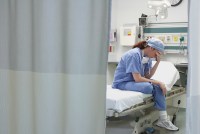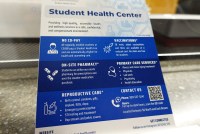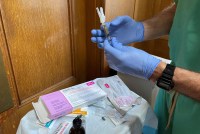Latest Morning Briefing Stories
California Fails to Adequately Help Blind and Deaf Prisoners, US Judge Rules
Thirty years after prisoners with disabilities sued and 25 years after a federal court first ordered accommodations, a judge found that California prison and parole officials still are not doing enough to help deaf and blind prisoners — in part because they are not providing readily available technology such as video recordings and laptop computers.
Dietary Choices Are Linked to Higher Rates of Preeclampsia Among Latinas
Researchers at the USC Keck School of Medicine found that Latinas who ate vegetables, fruits, and healthy oils-based foods had fewer incidences of preeclampsia. More research is needed to determine the exact diet that could be beneficial.
El tipo de alimentación está vinculado a tasas más altas de preeclampsia en latinas
No hay una forma de curar o predecir la preeclampsia. La enfermedad puede dañar el corazón y el hígado, y causar otras complicaciones tanto para la madre como para el bebé, incluido el parto prematuro e incluso la muerte.
Attacks on Emergency Room Workers Prompt Debate Over Tougher Penalties
In California, assaulting paramedics or other emergency medical workers in the field carries stiffer fines and jail time than assaulting emergency room staffers. State lawmakers are considering a measure that would standardize the penalties.
Heat Protections for California Workers Are in Limbo After Newsom Abandons Rules
Proposed rules to protect millions of workers from potentially dangerous heat inside workplaces are dead after Gov. Gavin Newsom’s administration refused to sign off. Labor advocates and state regulators are calling for emergency regulations before temperatures soar this summer.
California Universities Are Required to Offer Abortion Pills. Many Just Don’t Mention It.
One year after California became the first state to require public universities to provide abortion pills to students, LAist found that basic information for students to obtain the medication is often nonexistent.
Emergency Physicians Decry Surprise Air-Ambulance Bills
Emergency room doctors say insurers are increasingly declining to cover costly air-ambulance rides for critically ill patients, claiming they aren’t medically necessary. And the National Association of EMS Physicians says the No Surprises Act, enacted in 2022, is partly to blame. The law protects patients from many out-of-network medical bills by requiring insurers and providers […]
A Mom’s $97,000 Question: How Was Her Baby’s Air-Ambulance Ride Not Medically Necessary?
There are legal safeguards to protect patients from big bills like out-of-network air-ambulance rides. But insurers may not pay if they decide the ride wasn’t medically necessary.
California’s Expanded Health Coverage for Immigrants Collides With Medicaid Reviews
A state policy to extend Medi-Cal to qualified Californians without legal residency is running up against a federal requirement to resume eligibility checks. The redetermination process is causing many Latinos, who make up a majority of Medi-Cal beneficiaries, to be disenrolled.
Move to Protect California’s Indoor Workers From Heat Upended by Cost Questions
A years-long process that would have created heat standards for California workers in warehouses, steamy kitchens, and other indoor job sites catapulted into chaos Thursday when Gov. Gavin Newsom’s administration pulled its support. Regulators, saying they felt “blindsided,” approved the regulation anyway. It’s unclear what happens next.
Secret Contract Aims to Upend Landmark California Prison Litigation
California has commissioned an exhaustive study of whether its prisons provide a constitutional level of mental health care, which it could use to try to end one of the lawsuits that have federal courts overseeing the state’s prisons. But corrections officials won’t disclose even basic details of the consultants’ contract, including its cost to taxpayers.
A New $16,000 Postpartum Depression Drug Is Here. How Will Insurers Handle It?
A pill form of an effective drug for postpartum depression hit the market in December, but most insurers do not yet have a policy on when or whether they will pay for it. The hurdles to obtain its predecessor medication have advocates worried.
California Voters Are Skeptical That More Money Is the Answer to Homelessness
California Gov. Gavin Newsom’s signature ballot measure to address mental illness, addiction, and homelessness with a $6.4 billion bond and other reforms, is barely ahead in the ongoing ballot count. The slim margin reflects a growing unease among Californians over the governor’s homelessness initiatives.
California Attorney General Boosts Bill Banning Medical Debt From Credit Reports
California Attorney General Rob Bonta has thrown his weight behind state Sen. Monique Limón’s legislation to bar unpaid medical bills from showing up on consumer credit reports. If passed, California would join just a few other states with such protections.
Newsom’s $6.4 Billion Homelessness Gambit Hangs by a Thread
California Gov. Gavin Newsom’s ambitious attempt to combat the mental health and addiction epidemic in his state is leading by a razor-thin margin, calling into question whether voters trust him to confront the state’s growing homelessness crisis. Newsom asked voters on Tuesday to approve his $6.4 billion bond measure, dubbed “Treatment not Tents” — the […]
California May Face More Than $40M in Fines for Lapses in Prison Suicide Prevention
A court expert reported that California prisons continue to lag on 14 of 15 suicide prevention measures, and even regressed in some areas. The state could face more than $40 million in fines after a federal judge warned more than a year ago that she would impose penalties for each violation.
Biden Team, UnitedHealth Struggle to Restore Paralyzed Billing Systems After Cyberattack
The cyberattack on a unit of UnitedHealth Group’s Optum division is the worst on the health care industry in U.S. history, hospitals say. Providers struggling to get paid for care say the response by the insurer and the Biden administration has been inadequate.
Biden’s Got a Taker for One of His Gun Safety Proposals: California
California could give President Biden a political win this year on gun violence. State senators passed sweeping legislation in January that would toughen gun storage requirements, embracing a White House priority that has languished in Congress. Many states, including California, have laws in place requiring gun owners to securely store their firearms when children are […]
California Pushes to Expand the Universe of Abortion Care Providers
A new California law allows trained physician assistants, also called physician associates, to perform first-trimester abortions without the presence of a supervising doctor. The legislation is part of a broader effort by the state to expand access to abortion care, especially in rural areas. Some doctor groups are wary.
California Hospitals, Advocates Seek Stable Funding to Retain Behavioral Health Navigators
California has supported expanded use of medications in the fight against opioid use disorder and overdose deaths. But hospitals and addiction treatment advocates say the state needs to secure ongoing funding if it wants more behavioral health workers to guide patients into long-term treatment.























